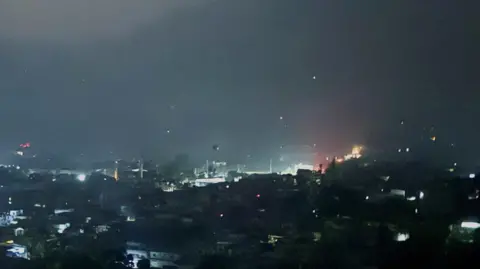The ongoing conflict between India and Pakistan has taken on a new dimension as India has conducted strikes in response to a high-profile militant attack. On May 7, 2025, two weeks after a deadly assault on tourists in Indian-administered Kashmir that resulted in the deaths of 25 Indians and one Nepali, India launched a series of operations targeting sites in Pakistan and Pakistan-administered Kashmir. The Indian defense ministry has officially labeled this initiative “Operation Sindoor,” framing it as a necessary response to hold accountable those responsible for the attack.
In contrast, Pakistan has condemned the airstrikes as unprovoked aggression. Prime Minister Shehbaz Sharif has made a statement vowing that this “heinous act of aggression will not go unpunished.” Pakistan’s military asserts that they have successfully shot down five Indian aircraft and a drone in its operations. However, India has not acknowledged these claims. Following the strikes, Pakistani authorities reported that eight civilians had lost their lives, while India cited that three civilians were killed due to Pakistani shelling in Indian-administered Kashmir.
India’s strikes were targeted at nine locations they deemed as “terrorist infrastructure,” operating under the assertion that these were sites where attacks against Indian nationals were devised and directed. Official statements from India emphasized that no military facilities of Pakistan were hit intentionally; rather, they described their actions as “focused, measured, and non-escalatory.” In a notable response to the attacks, Pakistani officials have reported hits in three areas: Muzaffarabad and Kotli in Pakistan-administered Kashmir, alongside Bahawalpur in Punjab, Pakistan. Defense Minister Khawaja Asif criticized India’s claims of targeting terrorist camps, labeling them as unfounded.
The backdrop to this latest confrontation is a series of escalations in hostilities between the two nuclear-armed countries, following the Pahalgam shooting that shocked the region. Survivors described the assailants as specifically targeting Hindu men in an attack that claimed 26 lives and marked the deadliest on civilians in many years. Indian Prime Minister Narendra Modi responded emphatically, asserting a commitment to pursue and punish the perpetrators “till the ends of the Earth.”
While the Indian authorities did not specify which militant groups were involved, Indian police have suggested that at least two of the attackers were from Pakistan, further straining relations. Pakistan has firmly rejected these allegations, maintaining that it had no association with the April 22 attacks. In the two weeks leading up to Operation Sindoor, both nations engaged in reciprocal actions, including the expulsion of diplomats, visa suspensions, and the closure of border crossings.
The Kashmir region has been a longstanding point of contention since the partition of British India in 1947, with both nations claiming the territory fully but administering it only partially. The skirmishes and tensions have historically escalated into full-blown wars, with the conflict exacerbated by militant violence that erupted dramatically in Indian-administered Kashmir since 1989. The recent attack on civilians is particularly significant, marking the first major assault since India abrogated Article 370, which had granted Kashmir a degree of autonomy.
In previous years, heightened tensions have led to military responses such as surgical strikes by India, notably in 2016 and 2019, which followed attacks on Indian security personnel. The global community is closely monitoring the situation, with various international leaders, including UN Secretary António Guterres and US President Donald Trump, calling for restraint in the face of escalating violence.
The Kashmir conflict remains an intricate web of military, political, and communal challenges that both nations grapple with—a delicate situation that continues to draw global attention and concern. As the current hostilities unfold, the potential for broader implications raises an urgent need for diplomatic dialogues to de-escalate the situation and prevent further loss of life.



